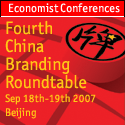Letters
Jul 15th 2004
From The Economist print edition
Moore to add
SIR – Lexington skips too lightly over Michael Moore's most fundamental contribution to the debate about American military adventurism: the complete lack of participation by America's conservative elite (July 3rd). This is an historical anomaly in the business of empires. It is extraordinary how risk-averse the current leadership of the Republican Party is in these matters. Go through their backgrounds and you will find few who have served in the military. Indeed, it appears that more leading Democrats have served in the armed forces than have Republicans. When bellicose leaders ask your children to fight wars in foreign lands but refuse to send their own that says something.
C. Rowley
Ellenville, New York
SIR – You say that “Fahrenheit 9/11” is potentially dangerous to Democrats in “middle America”. This is at odds with the success of the film in both liberal and conservative strongholds. Mr Moore's basic insight, that American political culture is nationalistic but not imperialistic, may contribute more to the film's poignancy and appeal than his controversial claims that are the subject of so much debate.
Christopher Greenwald
Chicago
SIR – Informed decisions are based on evidence or at least assertion, rather than cheap innuendo. If Mr Moore truly intends to sway voters, he must not think very highly of their intelligence. Sadly, the reception of his film is proving him right.
Jerry Tempelman
Jacksonville Beach, Florida
Communists in check
SIR – Democracy in the Czech Republic is alive and well (“One more defenestration”, July 3rd). While the Communists may have won 20% of the votes cast in June's European election, this accounts for only 6% of eligible voters. When the Communists finally decide to renounce all the horrors of the previous era, they may then become more acceptable as coalition partners. Until that time, Czech parties are free to choose mainstream partners that reflect mainstream views, and the wishes of the people. That is the essence of democracy.
Bill Eldridge
Prague
Top-up reform
SIR – If an education-voucher scheme were put in place that allowed top-ups, a simple way for working-class parents to save the extra money needed to send their children to private school would be for those that smoke to give up the habit (“Not just for the posh”, July 3rd). Parents have always sacrificed, scrimped and saved for the benefit of their offspring. Instituting a voucher scheme that does not allow for top-ups fails to recognise the fundamental drive of parents and will simply arouse their ire by dangling a desirable yet unobtainable carrot before their eyes, though admittedly a little closer. The Tory policy will preserve elitism for the elite as usual and attract opportunists rather than educationalists.
Kathrin Hamilton
Edinburgh
Case for the defence
SIR – Bagehot says that Britain's Ministry of Defence is “not taking a sharp enough axe to procurement programmes conceived during the cold war” and mentions the ministry's “fashionable obsession” with America (July 10th). I would like to correct the record. If Typhoon was only “designed to win air superiority in Europe” it would be an “over-sophisticated anachronism”. But this is not the case. Typhoon will be an agile multi-role fighter that will serve as the cornerstone of the RAF's future fighting capability. It will replace two single-role types providing both improved operational flexibility and cost savings. The RAF has taken delivery of seven aircraft and is delighted with its performance.
As technology develops, it becomes even more important that we, and our NATO partners, invest in the capabilities that enable us to operate alongside America. We are actively encouraging this with an emphasis on flexible, deployable, and technologically advanced and interoperable forces. However, I accept that while technology will make our forces yet more effective it will not replace the value of “boots on the ground”. Peace-support operations, for which British armed forces already—and rightly—have an unparalleled reputation, are a very good example of this.
Willy Bach
Minister for defence procurement
London
Pay-back time
SIR – Carlos Perez argues that holders of high-interest Argentinian bonds knew the risks of default were high and do not deserve their money back (Letters, July 3rd). This is outrageous. Millions of ordinary Argentines are on the verge of losing their savings because Argentine politicians were irresponsible and the IMF was too weak. It is not feasible to “attract back” offshore savings as the equity market is too small. An economic recovery based on not paying debts is an illusion. Managing the debt and paying it off may take time but it is better this way than resorting to populism.
David Hutchinson
Barcelona
SIR – The figure of 30,000 “missing” in your survey on Argentina does not match the official figure estimated by the ad hoc commission set up by the democratic government that prosecuted and imprisoned most of the senior members of the military regime it succeeded in 1983 (June 5th). It is equally bad if the desaparecidos numbered 30,000 or 8,960 (the official figure), but the propagation of this sort of erroneous information will not help the much needed reconciliation in a battered society.
S. Risso-Patron
Caversham, Berkshire
A grey area
SIR – The proposition that a large informal or “grey” economy contributes to a lower growth rate is false (Economics focus, June 19th). The study you cite ignores the many workers employed in the grey economy who would not otherwise be employed if it did not exist. If not for the grey economy, these workers would be dependent on welfare and state subsidies, which would drag down growth even more. Furthermore, the only losers from the grey economy seem to be economists, and of course tax collectors, whose morass of regulations and over-taxation create it to begin with.
Vijay Rao
Los Angeles
Ladies of the night-off
SIR – You note that call girls are being drawn from far and wide to service America's political conventions (“On the trail”, July 3rd). While standing in line to register for an American Economic Association annual meeting some years ago, I overheard someone remark that the prostitutes of New Orleans look forward to the arrival of economists in town. While glancing at my colleagues in their ill-fitting suits and dragging cardboard suitcases, I heard the following clarification: “It's their opportunity to take a week off.”
Robin Watson
Berlin
Security barrier
SIR - Israel's security barrier will reduce Palestinian hardships in the long term, by stopping terrorism and creating conditions for peace (”Israel's illegal but unstoppable barrier”, Economist.com, July 9th). There will be no peace until terror ends, and terror won't end until there is barrier. Palestinians say the barrier encroaches on their future state; but there will be no state until the terror stops, and measures short of a barrier have failed to stop the killing. Having failed to stop the terror themselves, Palestinians must accept the barrier as a necessary hardship on the road to a state.
Ilya Shlyakhter
Brighton, Massachusetts
Who's disappointed?
SIR - You say that, in his stint as president of the European Commission, Romano Prodi “has largely disappointed” (”The summit of all fears”, Economist.com, June 16th). I would argue instead that he has been disappointed. Mr Prodi and his coalition engineered a remarkably productive period in Italian politics between 1996 and 1999, putting Italy squarely on the European map through hard work. And surely his national success, intelligence, resourcefulness and political acumen should have been more than sufficient to do ever greater things in Brussels. But he discovered very early on in his tenure that the puppetmasters of Europe, France and Germany, are uninterested in initiatives and perspectives originating in other parts of the continent. Those who criticize Mr Prodi on his way out of office should also acknowledge France and Germany's discomfort with the idea that anyone else but they should have a significant say in Europe's future.
Mr Prodi's disillusionment with the pan-European scene prompted him to campaign for the Italian centre-left in the recent European Parliament elections. In Italy, at long last, he has the opportunity to once again employ his talents, this time in the noble cause of felling the disastrous Berlusconi-led government. Forza Romano!
Alberto Prieto
Austin, Texas
Chaos in Iraq
SIR - You say that “the insurgents have done everything they can to ensure this is so, in particular by destroying the economic infrastructure that could create growth, such as oil pipelines” (”Violence, chaos and the Saddam show”, Economist.com, July 5th). I am shocked that you would blame insurgents for the economic and social problems in Iraq. How quickly you forget the years of sanctions and a power vacuum left by an inadequate and impotent occupation.
Sarah Yassien
Sydney










